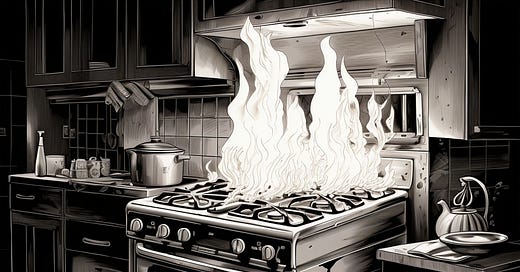It's 2023. Homes shouldn't come with gas stoves.
Induction cooktops are technologically superior.
I grew up with a gas stove. I remember when my parents first got one. The benefits were immediately clear: if the power went out, you still could cook on the stove, and you had immediate temperature control.
But that was two decades ago. Today, a newer technology can match the instantaneous temperature control gas stoves became famous for. It's called induction.
Induction cooktops work by generating an electromagnetic field with pots and pans that have a certain type of conductive metal at the bottom. This electromagnetic field generates heat within the pan and cooks your food. It also keeps your kitchen cooler.
The benefits of induction cooktops
Induction cooktops have a lot of benefits over other cooktops:
Up to three times more efficient: They convert more of the energy used into heat, compared to gas stoves. This means you can save money on your energy bills.
Easier to clean: The smooth surface is easy to wipe down, unlike gas cooktops.
Generally safer: They do not produce harmful fumes, and when a pot or pan is removed from the surface, it cools quickly and will not cause third-degree burns to a child who touches it. This makes them a safer option for families with young children.
Harmful fumes avoided by induction cooktops
Induction cooktops do not run on methane, the main component of natural gas. The term "natural gas" is a marketing term developed by the gas industry to make methane more appealing to the general public.
Constantly burning methane gas in your home, as you might expect, does have serious health consequences for you and anyone else in your home. Several carcinogens and other compounds that are released and not burned off by the flame can cause asthma and other negative health consequences, especially in children. And unfortunately, a lot of the exhaust fans in kitchens don't correctly ventilate the toxic fumes out of your home, because they lack the necessary ductwork to move air outside.
Why people still choose gas stoves
Despite these many benefits of induction cooktops, why do some people still prefer gas stoves? There are three main reasons for this:
Worries about power outages. Gas stoves can still be used when the power goes out, while induction cooktops require electricity.
Marketing by the gas industry. The gas industry has been marketing gas stoves for decades, and this has created a perception that they are the superior choice.
Cultural identity. Some people view gas stoves as part of their cultural identity, and they are reluctant to switch to a new technology.
The future of induction
Some of the roadblocks to adoption of induction cooktops are easier to overcome than others. For example, if you have the means, it is now relatively easy to install solar panels and/or battery backups for your home, which would allow you to cook even if the power goes out.
As more people experience the benefits of induction cooktops, I believe that word-of-mouth will help to spread awareness of their advantages. This includes the ability to match the instantaneous temperature control that is central to the gas industry's "cooking with gas" marketing campaign. Additionally, as a more climate-conscious generation starts buying homes, they will be less swayed by industry marketing.
The most difficult hurdle for induction cooktops may be political, at least in the United States. Once something becomes part of the "culture war," rationality can go out the window. Once a product becomes part of a group's identity, it becomes much harder to convince that group that there is something better.
We have seen this happen with other technologies, such as LED lightbulbs and electric cars. However, when you upgrade to better technology, you usually get additional benefits. LED lightbulbs are more efficient and allow for added functionality with smart light features. Electric vehicles are quieter, accelerate faster, and (in my opinion) are just more fun to drive.
Whether holdouts like it or not, superior technology usually wins. LED lightbulbs are now the default, and electric cars are well on their way to becoming the default. One day, induction stoves too, will also be the default. Will you be one of the early adopters? I certainly will be.





